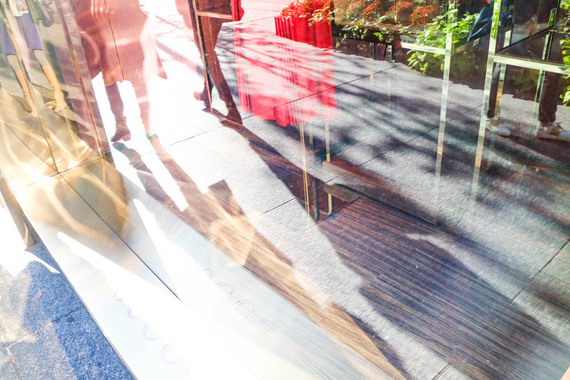
(Photo: Andrea Mai)
Is self-acceptance something you learn gradually or can it be achieved effortlessly by claiming it?
That was the question that came up in a discussion with a friend on the topic of self-acceptance. It's a much talked about subject that comes up in spiritual circles and personal development groups. The common wisdom is that we should accept who we are -- "Just be yourself," or "Be authentic" -- but we all know that it's not as easy as it sounds. It's harder to accept our own shortcomings than it is to accept that of others.
My belief is that self-acceptance is something you make a choice about. On a mental level, you could practice a form of self-acceptance, perhaps seeking ways to gain it by using affirmations or going to therapy. But it is through life itself that you are most likely to encounter situations or challenges that will either help to reinforce your self-acceptance, or call into question the beliefs you have about yourself. Self-acceptance is not a final destination or end goal. Although an attitude shift makes a huge difference, no amount of focus on the concept of self-acceptance without the practice of it is going to make it easier or happen faster. However, I do believe that life will show you the way to become self-accepting through the challenges that present itself. The way I've come to perceive challenges is that they are opportunities to develop your character and to test your limits, which result in personal growth.
When I was in high school, I was diagnosed with Stargardt disease, a rare genetic condition that affects my eyesight, causing extreme nearsightedness. This limits my ability to see clearly. I can't drive and things that are farther than a few inches look blurry to me.
When I was younger, all I wanted was to fit in and be perceived as "normal." In school, I pretended nothing was wrong. I scribbled in my notebook, pretending to copy notes from the chalkboard and flipped through pages of books I pretended to read during silent reading time.
After having an official diagnosis, it relieved me to know what it was and I could accept it on some level. But not enough to tell people about it and get help for it. I struggled through out high school and university. My family and I also sought out treatments in hopes that it could improve my vision. But all this just proved to be a lack of acceptance of the situation.
It wasn't until I was involved in a love relationship that I felt that I needed to tell my love interest. My motivations for doing so was to make sure he didn't think I was acting weird if I couldn't see him from a distance or if I needed help reading a restaurant menu or sign.
Later on, I decided to disclose my disability to my employers. I had never done so in the past, for fear of discrimination or being stigmatized. I hid it in case someone might doubt my abilities or question my competence to do the job. And I certainly did not want others to pity me. When i was offered a new job, I told my new boss about my disability and I eventually got used to having people around me know about my condition.
Because my disability isn't obvious -- I don't wear dark glasses indoors, or carry a white stick -- it's only apparent to people observant enough to notice that my pupils tend to look upwards, rather than remain centered. I would occasionally get comments from strangers asking what I was looking at, and if there was something wrong with their hair. There would be that somewhat of an embarrassing reveal about my condition. Their reaction would seem awkward and apologetic. After this happened a couple of times, I got over it.
Last year, I decided to become a photographer. My friends who know that I am visually impaired were astounded by my photographs. They couldn't understand how I could be creating such fantastic work. One of them suggested that I tell people about my disability because they found it inspiring. I decided that I would become even more open than before and disclose it publicly on my blog and social media profiles.
Today I feel that I can openly discuss my disability because I feel self-acceptance for myself. It took most of my life so far to get here, but now I can look back and appreciate the journey to get to this place in my life.
Self-acceptance isn't something that happens overnight, but it's something one can consciously choose to adopt as their attitude through the practice of mindfulness. From time to time, we will be tested by life situations that will reveal just how much self-acceptance we really have for ourselves. And as time goes by, we may reach greater and higher levels of self-acceptance. Ultimately, it all really starts from a decision to tell yourself, "I love and accept myself."
-----------
Andrea Mai is a legally blind photographer based in Toronto. She enjoys travel and discussions about philosophy and personal development. Her work is regularly posted on her blog at www.andreamaicreative.com and you can follow her on Instagram @andreamaicreative.